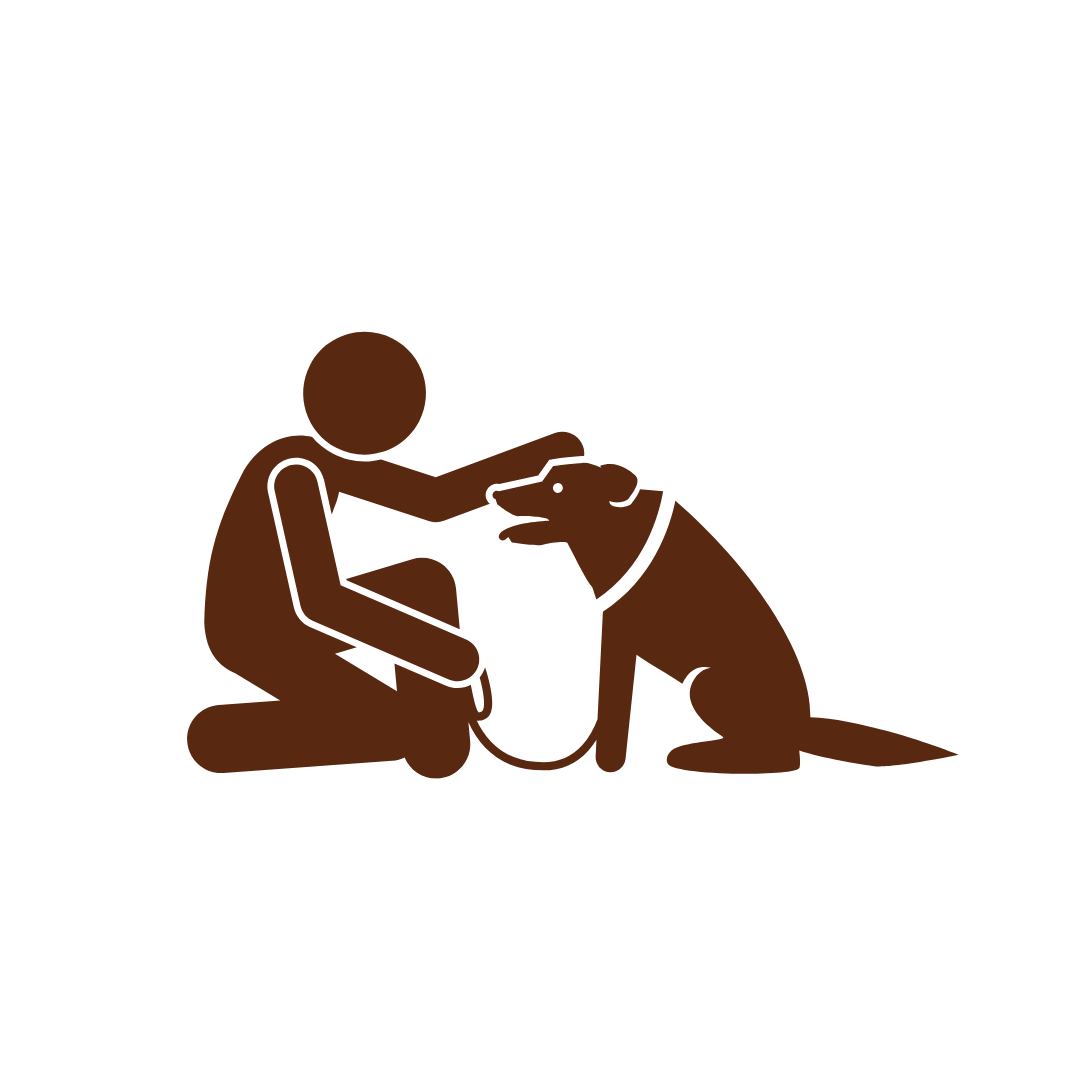Dog Hotel

School for guide dogs
TRAIN YOUR OWN DOG TO BECOME A SERVICE DOG
At Doggy Village, we specialize in training exceptional service dogs to help people with disabilities and medical needs. Our experienced trainers use positive reinforcement techniques to teach dogs basic skills such as mobility assistance, medical alert, and emotional support. Through personalized training programs and ongoing support, we ensure that each service dog is a reliable, loving companion ready to change lives.
What types of service dogs do we train?
- Medical alert dogs
- Mobility dogs
- Hearing dogs
- Psychiatric Service dog
- Therapy dogs – this is not a service dog
All our dogs receive a certificate from Jasmin Mayer, who is a certified assistance dog trainer by the German Assistance Dog Center TARSQ.

Medical Alert Dogs
Medical service dogs are specially trained to detect and respond to medical conditions such as diabetes, seizures or heart disease. These amazing dogs use their heightened senses to provide early warnings, deliver help or assist in emergencies, offering safety, independence and peace of mind to their caregivers.
These highly skilled dogs provide safety, independence and life-saving assistance to people with medical conditions.
-
Migraine assistance dogs
They detect changes in the caregiver's scent or behavior that precede a migraine.
-
Assistance dogs for people with diabetes (DAD)
They detect changes in blood sugar levels and alert their caregiver before it becomes dangerous.
-
Dogs that signal epileptic seizures
They anticipate attacks and help during and after them by calling for help or providing comfort.
-
Cardiac warning dogs
They detect irregular heart rhythms or changes in blood pressure and notify the caregiver.

Mobility Support Dogs
Mobility dogs are trained to accompany people with physical disabilities or limited mobility. They assist with tasks such as handing items, opening doors, pressing buttons, and maintaining balance. These loyal canine companions enhance independence and improve the quality of life of their owners.
-
Balance dogs
Helping people with stability issues by providing physical support while walking or standing.
-
Assistance dogs for wheelchair users
They help people in wheelchairs by picking up dropped items, opening doors or pulling a wheelchair.

Psychiatric Service Dog
Psychiatric Service Dogs are specially trained to help people with mental health conditions like PTSD, anxiety, depression, or bipolar disorder. They provide calm during panic attacks, remind caregivers to take their medication, encourage them to stop harmful behaviors, and offer emotional support.
-
Assistance dogs for PTSD
They support people with post-traumatic stress disorder by helping them to detach from painful memories, exerting calming pressure, or providing a sense of safety in crowds.
-
Anxiety assistance dogs
They help during anxiety attacks by grounding the caregiver, providing tactile stimulation, or leading them to a quiet, peaceful space.
-
Assistance dogs for people suffering from depression
They offer emotional support and help with daily activities. They remind caregivers to take medication or wake up on time.
-
Assistance dogs for people with bipolar disorder
They support caregivers by recognizing mood changes and encouraging the use of coping mechanisms during manic or depressive episodes.

Assistance dogs for the hearing impaired
They are trained to assist deaf or hard-of-hearing individuals and alert them to important sounds, such as doorbells, alarms, or someone calling their name. These attentive companions ensure safety.
-
Sound Alert Dogs
Trained to alert caregiver to everyday sounds such as telephones, doorbells, or alarm clocks.
-
Emergency Alert Dogs
They specialize in responding to critical sounds such as fire alarms, sirens, or smoke detectors.
-
Dual Role Hearing Dogs:
They combine the role of Sound Alert Dogs and provide emotional or mobility support.
-
Personal Alert Dogs
They help identify more personal auditory cues. They respond to calling the handler's name or a baby's cry.

Therapy dogs
Therapy dogs provide comfort and emotional support to people in hospitals, schools, and nursing homes. These gentle, well-trained dogs bring joy and relief in stressful situations, improving the well-being of their caregivers.
-
Dog therapy dogs
Trained to visit hospitals, schools, and nursing homes and provide comfort and companionship to those in care.
-
Animal Assisted Therapy (AAT) Dogs
Designed to work with healthcare institutions during organized therapeutic sessions involving various animal species.
-
Facility Therapy Dogs
Prepared to live and work in facilities such as nursing homes or schools and provide ongoing emotional support to those in their care.
-
Support dogs in crisis management operations
Trained to comfort people affected by traumatic events, such as natural disasters, they help reduce feelings of tension, provide reassurance, and bring peace.
Szkolenie psa na psa asystującego odbywa się głownie w języku angielskim
How to apply? Step by step
-

1. Complete the application
Fill out the surveyThe application must specify the type of assistance dog and include a medical certificate from the owner. The application fee is PLN 250. Once approved, we will contact you to schedule an appointment.
-

2. Test whether the dog is suitable for work
Once your application is approved, we'll assess your dog and begin initial training to assess its suitability for becoming an assistance dog. The assessment (in-person or online) costs 250 PLN and lasts up to 90 minutes (this fee, along with the application fee, will be refunded if you decide to begin the assistance dog training program after passing the application process).
-

3. Medical recommendation and approval of the dog
The veterinarian assesses the dog's health. This is especially important for dogs that are mobile. These dogs must be free of congenital defects, joint dysplasia, or chronic diseases.
-

4. Payment for the Assistance Dog Program
Once your dog is ready to begin proper training, you will be required to pay 50% of the course fee towards your service dog program (this amount is non-refundable).
The minimum cost of training a service dog is PLN 25,000 (the cost may be higher as some dogs require more than 100 hours of work), payable in installments. -

5. Training program
A minimum of 100 hours of training is required for a dog to be eligible to take the exam leading to certification as an assistance dog. As part of the program, the dogs will be trained in public places such as bus stops, department stores, airports, and other public transportation. During the training, the dog will be scheduled to fly at least once. The dogs will be trained in groups and individually.
-

6. Final exam
After successfully completing the training, which can last from five months to two years, we will meet for a final certification exam. The exam is based on international standards and requirements. If you and your dog pass the exam with a score of 90% , you will receive a certificate confirming that your canine companion has become a qualified service animal. You can retake the exam as many times as you like.
Rodzaje Programu na psa Asystenta
-

Program łączony Online i Stacjonalny
Program szkolenia psa asystenta może zostać rozpoczęty w formie online, jednak maksymalnie 50 godzin zajęć może być zrealizowanych zdalnie. Pozostała część programu musi odbywać się stacjonarnie, w bezpośrednim kontakcie z trenerem oraz psem, zgodnie z obowiązującymi standardami szkolenia psów asystentów.
PROGRAM ODBYWA SIĘ W JĘZYKU ANGIELSKIM
-

Program Stacjonalny Warszawa
Nasz program szkolenia psa asystenta odbywa się stacjonarnie w pełnym wymiarze – bez zajęć online. Zajęcia prowadzone są w nowoczesnym centrum szkoleniowym Doggy Village, w bezpośrednim kontakcie z trenerem i psem, co gwarantuje najwyższy standard i efektywność treningu.
PROGRAM ODBYWA SIĘ W JĘZYKU ANGIELSKIM

Our Trainer
Jasmine Maier
I'm a certified dog trainer and behavioral consultant specializing in service dog therapy and training. Over the years, I've worked with dogs in a variety of capacities, helping them reach their full potential as companions, emotional support animals, and special-purpose trained animals.
I introduced service and therapy dogs to Qatar. The first dog I trained, my own cardiac care provider, Charlie, now visits schools and universities across the country.
As a certified therapy dog handler and trainer, I am committed to building a special bond between assistance dogs and their caregivers.
Certyfikaty

Nasz Trener
Captain Mohammed Ali
Jestem Dynamiczny i posiadający międzynarodowe certyfikaty trener psów z ponad 17-letnim doświadczeniem w szkoleniu psów i modyfikacji ich zachowań.
Posiada umiejętności w zakresie opracowywania i wdrażania dostosowanych do potrzeb programów szkoleniowych, które dotyczą szerokiego zakresu problemów behawioralnych i poprawiają posłuszeństwo różnych ras.
Posiada doświadczenie w wykrywaniu materiałów wybuchowych, narkotyków i chorób roślin, wykorzystując specjalistyczne techniki szkoleniowe w celu zapewnienia precyzji i niezawodności. Uznany za stosowanie metod pozytywnego wzmocnienia w celu budowania zdrowych relacji między psami a ich właścicielami. Biegły w szkoleniu psów w zakresie gryzienia, wzmacniającym instynkty ochronne psów przy jednoczesnym zapewnieniu bezpieczeństwa i kontroli.
Biegły w prowadzeniu warsztatów i seminariów, edukujących klientów w zakresie skutecznych praktyk szkoleniowych i odpowiedzialnej opieki nad zwierzętami. Pasjonat poprawy dobrostanu psów i zaangażowany w ciągły rozwój zawodowy w dziedzinie szkolenia psów.























